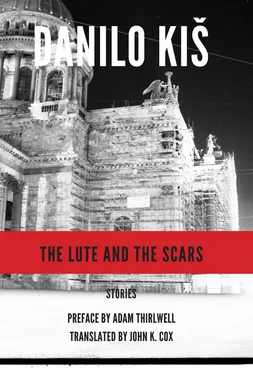“Talent is a curse,” he said to me. “Pushkin suffered on account of his talent. People envy nothing so much as a divine gift. Prodigies are rare, while mediocrity is legion. It’s an unending struggle. And don’t you go bury yourself in books. Travel. Listen to people. And listen to your own inner voice. Now, Marija Nikolajevna is expecting to see you too. Don’t get upset if she scolds you from time to time. She’s sick. And unhappy.”
Marija Nikolajevna, wrapped in a threadbare woolen shawl, was sitting by the window. The window gave onto a gloomy courtyard surrounded by battered walls.
“I read in the newspaper,” she said, “that the theater company you work with is going to Russia. Are you going along?”
“Yes,” I answered. “We’re going on a fifteen-day tour.”
“That’s what the paper said. Could you do us a favor?”
“I’d be happy to.”
“I’ve written down two addresses for you here. The first one is my sister’s: Valerija Mihajlovna Ščukina. The second is for Marija, like me, Marija Jermolajevna Siskova. That’s her best friend. Once she was my best friend, too. The last letter I received from either of them was in January of ’56. So, nine years ago. There’s a chance that they’re both still alive, or at least that one of them is. I assume that there would’ve been somebody to notify me if they had died. But just in case, take this — another name. Karajeva. Natalija Viktorovna. She’s the youngest of all of them. Let me write down her address for you, too. She could tell you what became of them, in the event you can’t find those first two. Would it be too hard for you to do this for us?”
On the second day after our arrival in Moscow, I was able to bribe the stern-looking caretaker on our floor. In front of the entrance to the hotel an invalid in a shabby army coat was standing propped up on crutches; he held out his greasy cap to the passersby. I gave him a bit of change. He tendered his thanks as though reciting a passage from Dostoyevsky.
I had barely turned the corner when I came upon the taxi stand that I’d discovered the day before, during our official tour of the city. The taxi took me to a large apartment building with a grim entrance and long, cold corridors.
I approached a couple of girls who were playing by the door. They looked at me, flabbergasted, and then scattered without a word. Finally a woman showed up and I read off the name and address to her.
“I don’t know,” she said.
“Who else can I ask?”
“I don’t know. There are a lot of tenants here.”
I didn’t intend to give up. Once inside the building I figured out how things were numbered and what the abbreviations in the addresses meant; they represented the doorways, floors, building wings, and then individual apartments. At last, when I’d figured out the note, I knocked on a door. After a long pause, I heard a woman’s voice: “Who is it?”
“I’m looking for Valerija Mihajlovna Ščukina.”
“She doesn’t live here.”
The voice came from just behind the planks of the door; I knew that the woman was observing me through the peephole.
“Maybe you know where I could find her?”
“You’re a foreigner?”
“Yes. A foreigner.”
I heard the woman unlocking the door. She stuck out her head.
“Let me have a look at it.”
I gave her the address. “Do you know any of these three people?” I asked.
She shook her head.
“We’ve only been living here for three years. Ask over there, down at the end of the hall. Last door on the right. Ivanovna. Varja Ivanovna Strahovska. She might know.”
Then she handed me the piece of paper back; I heard her locking the door.
I knocked slowly, cautiously. No one responded. At some point it dawned on me that no one was behind the door, and I pushed down on the handle. The room measured about five meters square. A lightbulb without any kind of shade hung down from the ceiling. In the corner was a massive stove, like the ones in factory canteens. I understood then that this was the communal kitchen for the whole wing of the building. Feeling like I’d stumbled onto a secret hiding place, I exited quickly and closed the door behind me. But my inspection had apparently not gone unnoticed.
“What are you doing here? Who are you?”
The woman was enveloped by a large knit shawl; she wore her hair done up in a big bun. On her feet were stiff army boots.
“Excuse me,” I said, handing her the paper with the addresses as if it were an official form. “They told me that Varja Ivanovna lived here. Strahovska.”
“You’re a relative of hers?”
“You could say that.”
“A foreigner?”
“A foreigner.”
“Varja Ivanovna is very ill. Her heart. Wait here.”
She knocked on the door right across from the community kitchen; she disappeared for a minute and then reappeared.
“She says she has no relatives abroad. Or anywhere else.”
“I’m a friend of Marija Nikolajevna Aleksinka. Tell her that. She’ll know.”
The woman went back into the room without knocking again. This time she was gone longer. At last she emerged.
“Go in for just a bit. I take care of this building. You should have called ahead. Go on in.”
The room resembled a cell. Bare walls. A bed against the wall, and next to it a stool. A glass of water and a little bottle of prescription medication on the stool. A pale gaunt woman lay with her head on a thin pillow, covered up to her chin with a singed army blanket.
“I am Varja Ivanovna Strahovska. I heard who you are. You were asking about Natalija Viktorovna Karajeva. She died two years ago, in this same bed. She was a friend of Marija Jermolajevna, who died four years ago. No, it was five. I knew Marija Nikolajevna Aleksinka too. And her children. They died in a fire. I’m glad to hear that she’s still alive. Her sister, Valerija Mihajlovna Ščukina, was the first one to die, about eight years ago. Well, now I’m dying in turn. I’ve told you everything I know, so please leave me in peace. I don’t feel up to remembering anymore, or talking either. I’m preparing to die. Meetings in this world mean nothing to me now.”
“Forgive me, but I’d like to be able to tell Marija Nikolajevna a bit more about her sister. And all the others.”
“What is there to tell you? There are lives that it turns out weren’t worth living. We lived as if we were dead. Farewell.”
She closed her eyes, a sign that she was ending our conversation. At that point the door opened. “So, you found her alive after all,” said the woman with the bun in her hair. “Now go, before I call the cops.”
For months following my return from the tour, I put off visiting my old landlord and landlady. But one day, walking past the Zvezda cinema, I looked them up. First I walked into Nikolaj Aleksinski’s room. He was reading Berdyaev. I shared my impressions from the tour and told him about the visit to the Novodevichy Cemetery and the Lenin Mausoleum. He served me kirsch.
Then Marija Nikolajevna appeared in the doorway.
“Pardon me,” she said. “I don’t want to disturb your carousing. I just wanted to check in with our traveler. Is he still unlucky at love?”
“We’re talking about Moscow,” I said. “And Leningrad.”
“Ahhh,” came the reply. “But then what can you see in two weeks? Nothing.”
“I saw Dostoyevsky’s grave,” I countered. “And Blok’s.”
“You see?” Marija Nikolajevna said, appealing to the old man with her hands. “I told you he would forget to look for my sister. He did nothing in Russia but drink vodka with the actresses. He’s a bohemian.”
“I couldn’t get away from the group. That’s not easy to do in Russia.” (Then I translated it into our sign language.)
Читать дальше












